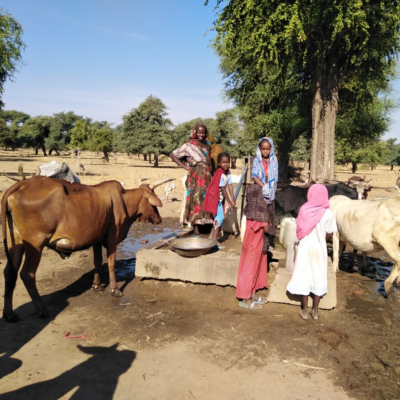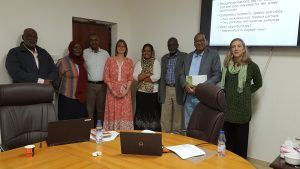Taadoud Transition to Development Project I & II

Taadoud is a program that promotes resilient livelihoods across all five states in Darfur, Sudan. It is implemented by a consortium of six NGOs (see partners tab). The project began in 2014 and entered its second phase in 2018. Taadoud I primarily focused on supporting households to recover from the impact of the events of the past 20 years in Darfur. Taadoud II focuses on institution building using a holistic approach of natural resource management that simultaneously improves the productivity of livelihoods and strengthens community and state level disaster risk reduction and climate change adaptation.
Feinstein leads the operational research component in partnership with the Universities of Al Fashir (North Darfur) and Zalingei (Central Darfur).
Taadoud I was a three-year humanitarian program that began in 2014. The program took place across all five Darfur states in more than 200 communities.
Taadoud I aimed to support conflict-affected households to rebuild their livelihoods and to prepare them to deal with future shocks and stresses. The operational research showed that the Darfur economy and household resilience are driven by households’ abilities to engage in cultivation and livestock rearing. The long-term success of these livelihood strategies, therefore, depends on access to and sustainable use of natural resources, which in turn depends on relationships and the balance of power among the users of these resources.
The research analyzes how livelihood systems have been affected by the multiple shocks experienced in Darfur, the choices families have made to sustain themselves throughout, and the extent to which they have been successful. The field research was conducted in two phases: 1. a scoping study and 2. follow-up field research in West, South, and East Darfur. Together, these studies contribute to our understanding of resilience in the Darfur context, the nature of resilience in general, and provides guidance toward promoting resilience.
Feinstein led the operational research in partnership with Ahfad University for Women in Khartoum, Sudan.
Taadoud II is a resilience program that builds on the learning from Taadoud I (see Taadoud I tab). Taadoud II therefore aims to improve natural resource management and governance, reduce chronic malnutrition, and increase the resilience of livelihoods of vulnerable populations within all five Darfur states to achieve more sustainable access to natural resources.
Feinstein leads the operational research and uptake strategy in partnership with several Darfur universities. This phase of the research focuses on processes of systemic change to improve the resilience of local communities by:
- better understanding the socio-ecological context and relationships that determine access to and availability of resources within the wider landscape
- informing and modifying the Taadoud II theory of change and program activities
- identifying and engaging with a network
Taadoud II is a five-year program beginning it 2018. It directly supports 177,583 returnee and conflict-affected vulnerable households in 287 communities in 16 localities in Darfur.

Measuring the Resilience of Livelihoods in Darfur: The Income Streams Index
This report uses an innovative real-time index, the Income Streams Index (ISI), to teach us how households in three states in Darfur Sudan managed and adapted their livelihood activities in the face of multiple shocks of various types and sizes over three years.

Brief 4: Role of local governance and community-based institutions for the peaceful co-management of natural resources
This brief explores the idea that social relationships dictate people’s experience of the natural environment on which their livelihoods depend, to discuss the issue of peaceful natural resource management in Darfur.

Brief 3: Participation in Integrated Natural Resource Management Projects: Reflections from North Darfur
This brief explores community perspectives on integrated natural resource management (INRM) and aims to understand the incentives of natural resource users within Taadoud II areas to participate in INRM interventions.

Brief 2: Transforming Livelihood Systems: Meeting needs in a changing world
This brief reviews how farming, agro-pastoralist, and pastoralist livelihood systems in Darfur are permanently changing in response to these major changes and in the face of ever-increasing pressure on natural resources.

Brief 1: Changing Land Tenure Regimes
This brief reviews farming and pastoralist livelihood systems to highlight their evolving and overlapping tenure regimes. The learning brief series aims to promote awareness and understanding of natural resource use and management in Darfur to support the Taadoud II program and wider programs and policies to effectively build resilient livelihoods.

Role of Native Administration in Integrated Natural Resource Management and Conflict Resolution in Central Darfur State, Sudan
Researchers from the University of Zalingei in Central Darfur, Sudan, conducted this study to improve the understanding of the role played by the Native Administration in integrated natural resource management in Central Darfur over the last twenty years, and to understand the conflicts and disputes associated with land access.

The Role of Community-Based Natural Resource Management Mechanisms in Sustainable Livelihoods in North Darfur
Researchers from the University of Al Fashir identified ways that community-based mechanisms regulate access and use of natural resources in North Darfur.

Income Streams Index (ISI) Development: 2021 Interim Report
ISI is a measure of one aspect of resilience that is being developed and refined through a three-year longitudinal panel study embedded in the Taadoud program. This report uses data from six rounds of data collection and describes trends in livelihood activities, correlating them with ISI scores over time.

Natural Resources Management: Local Perspectives from North and Central Darfur
This field report provides an up to date information about the issues affecting the relationships between different users of natural resources within the changing context of Darfur.

Lessons for Taadoud II: Improving Natural Resource Management
This publication presents a literature review activities in covering topics related to the natural environment and natural resource management in the Darfur region. This desk review serves as a foundation and reference for the NRM field studies and series of briefs, as part of the Taadoud II program, as well as supporting the development of training materials.

Risk and Returns: Household Priorities For Resilient Livelihoods in Darfur
This report describes exactly how shocks have affected specific livelihood groups in Darfur, the extent to which people have been able successful at recovering their self-sufficiency, and why.

Briefing Paper: Risk and Returns: Household Priorities for Resilient Livelihoods in Darfur
Livelihood systems in Darfur have experienced massive shocks and extreme changes over the past two decades. Though most communities are making positive progress, their recovery from multiple shocks over the...

(Arabic) Briefing Paper: Risk and Returns: Household Priorities for Resilient Livelihoods in Darfur
Livelihood systems in Darfur have experienced massive shocks and extreme changes over the past two decades. Though most communities are making positive progress, their recovery from multiple shocks over the...

The Road to Resilience A Scoping Study for the Taadoud Transition to Development Project
This scoping study explores the resilience strategies of households in multiple livelihood systems by describing how households in Darfur have coped with conflict and other shocks over the past fifteen...
Webinar: Localizing Research – Lessons from Sudan
In early 2019, Tufts University (Boston, MA, USA), the University of Al Fashir (North Darfur, Sudan), and the University of Zalingei (Central Darfur, Sudan) began a partnership to conduct operational...
- Catholic Relief Services (CRS) (Lead Agency)
- Catholic Agency For Overseas Development (CAFOD)
- Norwegian Church Aid (NCA)
- Oxfam America
- United Methodist Committee on Relief (UMCOR)
- World Vision

The National Research Advisory Group advises Tufts to help ensure that the Taadoud II research is useful and relevant to international, national, regional, and local needs and that findings are shared effectively with key audiences.
The advisory group members have varied experience, backgrounds, and networks. The members are:
- Musa Abdal Jalil, University of Khartoum
- Shadia Abdelraheem Mohammed Daoud, Professor, Ahfad University
- Omer Egemi, University of Khartoum
- Siddig Eissa, UNESCO
- Salih Abdelmageed Eldouma, Executive Director, SOS Sahel Sudan
- Youssif El Tayeb, Darfur Development and Reconstruction Agency
- Abdalaziz Gaiballa, Professor at University of Sudan for Science and Technology; Coordinator of the Pastoralist Support Team
- Ibtisam Goreish, Animal Resources Research Corporation
- Aisha Hamid, Partners in Development Services
- Ali Hamid, Sudan Sustainable Natural Resources Management Project
- Manal Hamid, Federal Humanitarian Aid Commission
- Mohamud Hassan Omer, Professor, University of Bahari
- Mohamed Hussein Abdelgadir, Undersecretary for Ministry of Social Development
- Sawsan Musa Adam Abdul-Jalil, Lecturer of Economics, University of Khartoum; Founder, Sudanese Women Economists Association
- Azza Mustafa Mohamed Ahmed, National University of Sudan
- Nawal Osman, Founder of “Towards Enduring Peace”
- Mohamed Saleh Mango, Darfur Land Commission
- Mohammed Siddig Suliman, UNEP
- Abdelmageed Yahya, Professor, Sudan Open University; Chair of SOS Sahel Sudan
